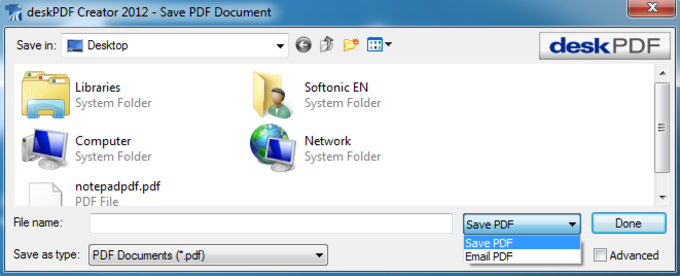

Despite the status of CC0 as the most free copyright license, the Free Software Foundation does not recommend releasing software into the public domain using the CC0.
#PDF24 CREATOR GUIDE LICENSE#
Outside the FOSS licensing use case for software there are several usage examples to utilize CC licenses to specify a " Freeware" license model examples are The White Chamber, Mari0 or Assault Cube. Instead, developers may resort to use more software-friendly free and open-source software (FOSS) software licenses. While software is also governed by copyright law and CC licenses are applicable, the CC recommends against using it in software specifically due to backward-compatibility limitations with existing commonly used software licenses. This allows Creative Commons licenses to be applied to all work falling under copyright, including: books, plays, movies, music, articles, photographs, blogs, and websites. Work licensed under a Creative Commons license is governed by applicable copyright law. Applicable works Wanna Work Together? animation by Creative Commons The second version of the Mayer and Bettle promotional animation explaining Creative Commons with Jamendo as an example

copyright law with incentives to Chinese innovators to innovate as a social contribution. Working with Creative Commons, the Chinese government adapted the Creative Commons License to the Chinese context, replacing the individual monetary compensation of U.S. International use Chinese use of the Creative Commons license As of July 2011, Creative Commons licenses have been ported to over 50 jurisdictions worldwide. To address this issue, Creative Commons asked its affiliates to translate the various licenses to reflect local laws in a process called " porting". legal system in mind therefore, the wording may be incompatible with local legislation in other jurisdictions, rendering the licenses unenforceable there. The original non-localized Creative Commons licenses were written with the U.S.
#PDF24 CREATOR GUIDE PLUS#
Ashcroft, in which the United States Supreme Court ruled constitutional provisions of the Copyright Term Extension Act that extended the copyright term of works to be the last living author's lifespan plus an additional 70 years. The CCL emerged as a reaction to the decision in Eldred v. The CCL allows inventors to keep the rights to their innovations while also allowing for some external use of the invention. Version 1.0 of the licenses was officially released on 16 December 2002. Lawrence Lessig and Eric Eldred designed the Creative Commons License (CCL) in 2001 because they saw a need for a license between the existing modes of copyright and public domain status.

History Aaron Swartz and Lawrence Lessig at the 2002 event for the first release of the licenses In October 2014, the Open Knowledge Foundation approved the Creative Commons CC BY, CC BY-SA and CC0 licenses as conformant with the " Open Definition" for content and data. While the Creative Commons license was originally grounded in the American legal system, there are now several Creative Commons jurisdiction ports which accommodate international laws. Released in November 2013, the 4.0 license suite is the most current. There have also been five versions of the suite of licenses, numbered 1.0 through 4.0. They were initially released on December 16, 2002, by Creative Commons, a U.S. Each license differs by several combinations that condition the terms of distribution. There are several types of Creative Commons licenses. CC provides an author flexibility (for example, they might choose to allow only non-commercial uses of a given work) and protects the people who use or redistribute an author's work from concerns of copyright infringement as long as they abide by the conditions that are specified in the license by which the author distributes the work. A CC license is used when an author wants to give other people the right to share, use, and build upon a work that the author has created. For the organization that produced them, see Creative Commons.Ĭreative Commons logo A video explaining how Creative Commons licenses can be used in conjunction with commercial licensing arrangementsĪ Creative Commons ( CC) license is one of several public copyright licenses that enable the free distribution of an otherwise copyrighted "work". This article is about the Creative Commons licenses.


 0 kommentar(er)
0 kommentar(er)
